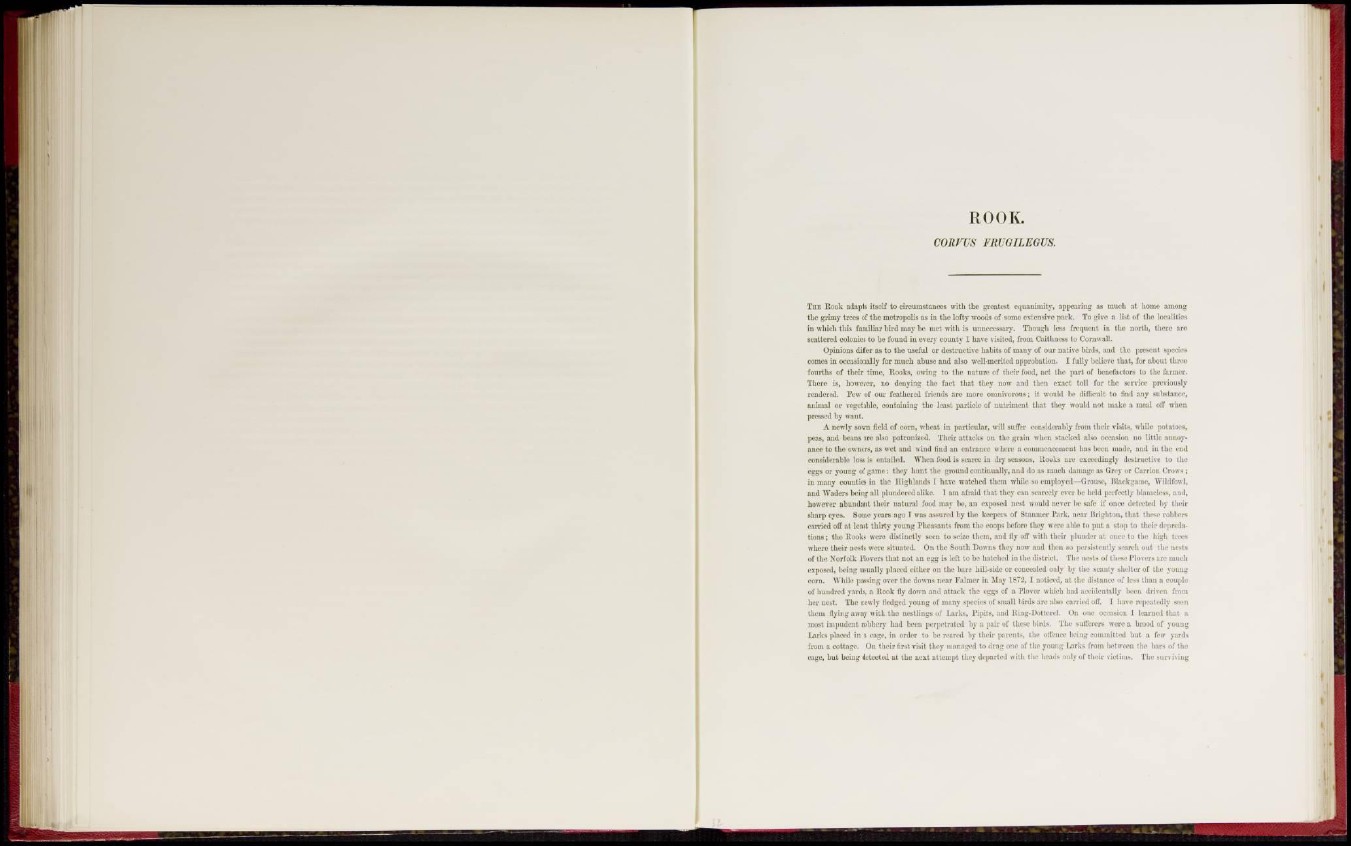
R O O K .
CORPUS FRUUILEOUS.
Tun Rook adapts itself to circumstances with the Greatest equanimity, appearing as much at homo among
the grimy trees of the metropolis as it) the lofty woods of some extensive park. To give a list or the localities
in which tins familiar bird may he met with is unnecessary. Though less frequent in tho north, there are
scattered colonies to he found in every county 1 have visited, from Caithness to Cornwall.
Opinions differ as to the useful or destructive habits of many of our native birds, and the present species
comes in occasionally for much abuse and also well-merited approbation. I fully believe that, for about three
fourths of their time, Rooks, owing to tho natuie of their foud, acf the part of benefactors to the farmer.
There is, however, no denying the fact that they now and then exact toll for the service? previously
rendered. Tew of our fealhered friends arc more omnivorous; it would he difficult to find any substance,
animal or vegetable, containing the least particle of nutriment that they would not make a meal oil' when
pressed by want.
A newdy sown field of corn, wheat in particular, will suffer considerably from their visits, while potatoes,
peas, and beans are also patronized. Their attacks on the grain when stacked also occasion no little annoyance
to the owners, as wet and wind find an entrance where a commencement has been made, and in the end
considerable loss is entailed. When food is scarce in dry seasons, Rooks are exceedingly destructive to the
eggs or young of game: they hunt the ground continually, and do as much damage as Grey or Carrion Crows;
in many counties in the Highlands I have watched them while so employed—Grouse, ftiackgamo, Wildfowl,
and Waders being all plundered alike. 1 am afraid that they can scarcely ever lie held perfect 1) blameless, and,
however abundant their natural food may he, an exposed nest would never he safe if once detected by their
sharp eyes. Some years ago I was assured by the keepers of Sranmcr Park, near Brighton, that these robbers
carried off at least thirty young Pheasants from the coops before they were able to put a stop to their depredations
; the Rooks were distinctly seen to seize them, and fly off with their plunder at once to the high trees
where their nests were situated. On the South Downs they now and then so persistently search out the nests
of the Norfolk Plovers that not an egg is left to he hatched in the district. The nests of these Plovers are much
exposed, being usually placed cither on the hare hill-side or concealed only by the scanty shelter of the young
corn. While passing over the downs near Palmer iu May 1S72, 1 noticed, at the distance of less than a couple
of hundred yards, a Hook fly down and attack the eggs of a Plover which had accidentally been driven from
her nest. The newly Hedged young of many species of small birds are also carried off. I have repeatedly seen
them Hying away with the nestlings of Larks, Pipits, and IIing-Dotterel. On one occasion I learned that a
most impudent robbery had been perpetrated by a pair of these birds. The sufferers were a brood of young
Larks placed in a cage, in order to be reared by (heir parents, the offence being t emitted hut a law yards
from a cottage. On their first visit they managed to drag one of the young Larks from lielw-eeu the bars of the
cage, hut being detected at the ncxl attempt they departed with the heads only of their victims. The surv iv ing